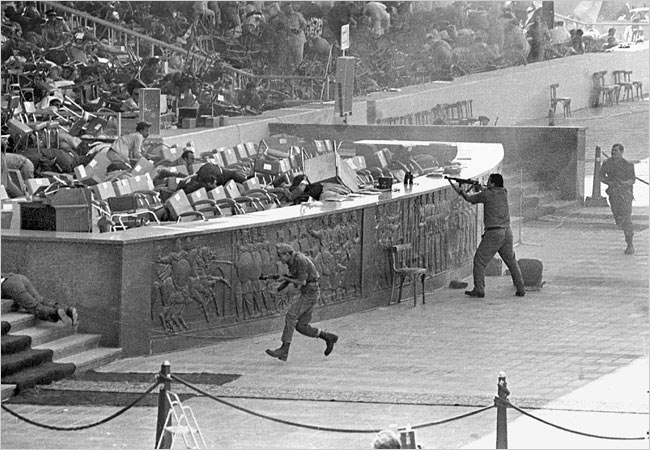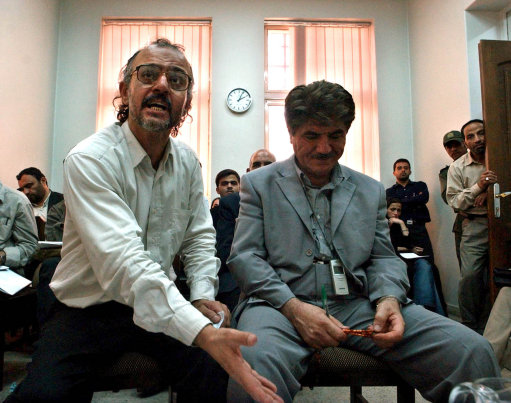
Neither in the Qur'an nor in the mutawatir hadith is there any mention of a this-wordly punishment for one who apostatises from his faith. The penalty for apostasy serves mostly a political purpose. If people act to confiscate freedom of conscience they are opposing the ruling of the Sharia.
IN A BOLD ARTICLE published by the Al-Ra’y al-ʽĀm newspaper on April 26, 2011, Professor ‘Alī Muhammad al-Hasan Abū Qināya criticised the Islamic Law Academy on many of its standpoints, rulings and fatwas, including the fatwa forbidding the issuing of licenses to the Zayn Communications Company, the question of apostasy and the punishment of stoning for an adulterer.
He also opposed the law academy’s monopoly on the issuing of fatwas and considered this to run counter to Islamic Sharīʻa. Professor Abū Qināya stated:
The Islamic law academy does not carry out legitimate rulings in that it runs counter to the judgement of the Sharīʻa on the question of one who apostatises from his Islamic faith, apostasy being a right which God Almighty has licensed and for which the reckoning is to take place in the next world before God, not before the Islamic Law Academy whose rulings against the apostate do not constitute the rulings of God.
The present writer agrees with the opinion, expressed by Professor Abū Qināya, that the reckoning of the apostate is something that is to take place before God in the afterlife, and that no institution has a right to prosecute the apostate at any time in this present life. The universal legal foundation for this is to be found in the Noble Qur’ān, as confirmed by verse 256 of the sūrat al-Baqara:
There is no compulsion in religion. The right direction is henceforth distinct from error.[1]
The Qur’ān confirms man’s freedom to choose whether to believe or disbelieve, and in return the responsibility they bear for this freedom will be made manifest on the Day of Reckoning when God shall judge them as to the choices they have made. This was confirmed by verse 29 of the sūrat al-Kahf where the Almighty states:
Say: (It is) the truth from the Lord of you (all). Then whosoever will, let him believe, and whosoever will, let him disbelieve. Lo! We have prepared for disbelievers Fire. Its tent encloseth them. If they ask for showers, they will be showered with water like to molten lead which burneth the faces. Calamitous the drink and ill the resting-place![2]
Neither in the Qur’ān nor in the mutawātir[3] hadith is there any mention of a this-worldly punishment for one who apostatises from his faith, nor is it recorded that the Prophet ordered the killing of anyone for his apostasy from Islam. Those who cite examples indicating that the Prophet issued punishments for apostasy are confusing this issue with the issue of an individual’s commission of a crime that called for the death penalty.
The Qur’an confirms man’s freedom to choose whether to believe or disbelieve
An example of this confusion is what is reported concerning ‘Abd Allāh ibn Khatal, who had become a Muslim and emigrated to Medina, and whom the Prophet sent in search of alms accompanied by a man from the tribe of Khuzāʽa. On one of these missions Ibn Khatal had asked his servant to prepare him food but then awoke from his sleep only to find that the servant had failed to prepare anything. He then struck him with his sword and killed him. Now he knew that on returning to Medina he would be killed in reprisal, and so he fled to Mecca, along with the alms money, and said to the Meccans: “I see no religion finer than yours”. He then proceeded to satirise and insult the Prophet and campaign against him, and for this purpose brought two serving girls to sing songs of mockery against the Prophet in the streets of Mecca. Those who say that that punishment exists for apostasy in the Sharīʻa do not present evidence from the sound, mutawātir hadith but instead rely on two āhād[4] hadith. One of these is related by al-Bukhārī and Muslim, the other is to be found in al-Bukhārī’s Sahīh. The first hadith is a hadith of ‘Abd Allāh ibn Masʽūd, which was related by al-Bukhārī and Muslim, and which runs:
“the blood of a Muslim may only be prescribed for three reasons: for one who commits an unjust slaying, for one who commits adultery with a divorcée or widow, and for one who forsakes his faith and abandons the community”.
The second hadith is that of Ibn ʽAbbās, reported by al-Bukhārī in his Sahīh:
“He who changes his religion, kill him.”
There is a consensus among scholars that āhād hadith are of dubious reliability and therefore only considered to be valid for purposes of reflection, and not held to be definitive. For which reason they are not considered useful to scholarship nor do they require to be acted upon. Is it therefore right to take such āhād hadith as authoritative corroboration for putting someone to death? Are these āhād hadith to cancel out the clear, unambiguous verses of the Qur’ān on this matter? How can we accept that there should be a contradiction between these two hadiths and the standpoint of the Messenger on the occasion of the Hudaybiyya Treaty,[5] when the Prophet agreed that those believers and emigrants who had joined him may be allowed to return to Quraysh, and at the same time gave full freedom to those who apostatised from Islam to rejoin the polytheists?
It is impossible, intellectually and legally, for the Sunna of the Prophet to feature anything that contradicts what the Qur’ān says, let alone abrogate it. If the principles of the Qur’ān clearly defined the issuance of religious freedom and surrounded it with every guarantee, and stipulated that the punishment of the apostate was for God Almighty alone to carry out in the next life, one cannot expect the Sunna to oppose this. This is particularly the case in that the issue does not appear in a single Qur’ānic verse, whereas something like 200 unequivocal verses concur on confirming the freedom of religious belief.
‘Umar ibn al-Khattāb opposed some of the Companions and the position taken by Abu Bakr on the campaign against apostasy, and nevertheless Abu Bakr did not cite against them the hadith recorded above. These alone would have been sufficient to halt any opposition to this military campaign. Why did he not do this? How could a distinguished Companion such as ‘Umar ibn al-Khattāb oppose this campaign if he were aware of these hadiths?
There is no link between the ‘Apostasy Wars’ and the penalty for apostasy
There is no link between the ‘Apostasy Wars’ and the penalty for apostasy, for the Apostasy Wars were a political endeavour undertaken by Abu Bakr, in which he actually demonstrated his far-sightedness since by means of them he was able to maintain the cohesion of the Islamic state in the face of a rebellion that would have lead to its dissipation. But this act of his cannot become a religious legitimizer to be adopted in contradiction to unequivocal Qur’ānic verses.
It serves mostly a political purpose. We have evidence of this in our experience in modern day Sudan when President Jaʽfar Numeiri ordered the execution of Professor Mahmud Muhammad Taha after he was condemned for apostasy, while he was arrested basically on the charge of propagating a ‘political’ programme that was inciting opposition to the government.
In Egypt during the 1990s a ruling was issued by the Family Court demanding that the wife of the late Dr Nasr Hamid Abu Zayd divorce him on the grounds that he was considered to be an apostate from Islam. The real reason behind the campaign waged against him was a political one. He was targeted by Islamist political leaders for his criticism, dissection and exposure of the mindset and practices of that current in his academic studies, in particular in his valuable work ‘A Criticism of Religious Discourse’ – for which he was declared an infidel.

Suggested Reading
In Iran a verdict of execution was promulgated against the reformist thinker Hashem Aghajari following his conviction on the charge of apostasy for having said: “Muslims are not apes that should unthinkingly imitate the religious clerics.” The verdict issued against him provoked a widespread wave of popular protest which forced the government to reduce the verdict to one of five years imprisonment, following a retrial on charges of attacking the principles of Islam and spreading propaganda opposing the Islamic regime, and publishing false materials intended to disturb public order. These are all political charges which have no relation to apostasy.
People are free to believe or to disbelieve, a freedom entrusted to them by the Lord who created them, and to whom we are to defer given that He forbade the Prophet and directed him to channel his enthusiasm towards propagating the call to Islam, so that no man should be compelled to believe. God addressed him in verse 99 of the sūrat Yūnis:
And if thy Lord willed, all who are in the earth would have believed together. Wouldst thou (Muhammad) compel men until they are believers? [6]
In conclusion, neither the Islamic Law Academy nor any other individual or religious institution has the right to snatch away this freedom granted by the Creator to His creation. If they act to confiscate this freedom they are, as outlined by Abū Qināya, opposing the ruling of the Sharīʻa.
[1] Qur’ān II,256
[2] Qur’ān XVIII,29
[3] A hadith of which the narrators constitute a group or large number, on the understanding that it is considered impossible for them all to agree to transmit a lie. See Glossary: ‘Hadith’.
[4] A hadith where there is only a single narrator, or class of narrators, for thus disqualifying it from being considered as mutawātir. See Glossary: ‘Hadith’
[5] A truce of ten years agreed between the early Muslim community and the Meccans in 628 AD, enabling individuals freedom of movement between the two communities, and the restoration to the Meccan community of those youths who had joined Muhammad without permission from his father or guardian. The agreement allowed the Muslims to make the first pilgrimage to Mecca the following year. (Ed.)
[6] Qur’ān X,99



